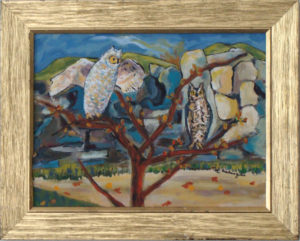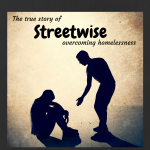 Soaring above the Crowd
Soaring above the Crowd
It wasn’t until I was in my mid-fifties that I could fly freely. One by one my five children had left the nest and though I did miss them I also enjoyed being free from the responsibilities of parenthood. Days of carpooling and worry about college applications being submitted on time were left behind. I understood howimportant it was to balance work with play and especially looked forward to the play part.
And so I started a new business publishing the Museum Tour Catalog and looked forward to utilizing the knowledge gained from running two museums. Not worried about supporting anyone but myself, I was open to failing or succeeding through my own wits and effort. It was a terrifying, exciting time filled with opportunities in a field that was new to me. I loved every minute of every day even when balancing the budget became difficult. Annual buying trips to China, evaluating hundreds of educational toys, working with talented people and brainstorming w
ays to improve service were challenging and stimulating activities. I lived in the flow at the the top of my abilities , sailing through highs and lows with relative equanimity.
One year our company decided to promote the catalog on a billboard in Times Square. Flashing lights bearing our logo moved across a sign located adjacent to the Toys”R”Us store. I must have gone out of my way a hundred times during a February visit in order to stand and stare at the crowds as they passed under the bil lboard. My wings were spread and I was flying high.
lboard. My wings were spread and I was flying high.
That remembrance returned as I watched a newly hatched Great Horned Owl extending its wings for the fi
rst time. He (or she) was a puffball, looking twice its size while covered in soft white down. Periodically the fledgling shifted, testing his stance while Mom sat stoically on a rock nearby and Dad perched unmoving on an overhead wire. They were waiting for evening to supply food for their chick that demanded ten feedings a day. Owls are patient parents and excellent hunters that often go after prey that is too large for them to swallow. Using their strong beaks and talons they tear off pieces that can be swallowed by their young. Tasty morsels of rabbits, squirrels, snakes, possums and fish augment their diet.
It takes about 9-10 weeks before a hatched chick learns to fly and a bit longer to learn hunting techniques. For another two weeks nurturing continues continues before their offspring is left to fend for themselves. The owl family often stays in the same vicinity over the summer but by fall they disperse to live solitary lives until the next mating season. Each night they can be heard hooting and their shadows observed soaring through the sky as they dive silently for food. You’ve heard them,haven’t you? “hoo-hoo hoooooo hoo-hoo?” I love the sound.
It is now graduation season and my granddaughter, Sanna, is among the thousands of youth nationwide marking the end of childhood and moving on to embrace new experiences. Her parents provided a secure childhood and equipped her with wings to to survive in the adult world. As she arranges to move out of her home, I sit back and contemplate where her flight will take her.
I also think of the freedom my daughter will have when all three children leave home. Her wings have been clipped for a great many years. Will she embrace opportunity or be bothered by an empty house?
Psychology Today describes parenting as a long-term investment. “Be prepared to put far more into it than you get out of it, at least for some time.” they say. Because of the stress of American culture, their happiness factor decreases the minute they become parents. “And it gets worse before it gets better.” Happily, in the long run, parenting is one of the most rewarding jobs life provides.
Children in the United States are often nurtured until they are in their 30s. Rarely are they pushed from home and told that they are on their own. Once they do leave they return for vacations, when they lack money or when jobs turn sour. They appear at the door after devastating divorces or when they are just confused about life’s choices.
Yet as children reach maturity and parental pressures lesson many feel sad, get depressed and grieve. The time and energy previously spent as a caring, nurturing adult has ended and energy needs to be redirected. Even those with returning children create new ways of relating to them. Healthy liaisons evolve into peer relationships that provide space for both parties to move independently. Once new hobbies, careers, and leisure activities develop freedom becomes cherished most parents no longer want to be care givers to their children.
A period of rapid growth and contentment swept over me as I adjusted to an empty nest. I was often surprised that my wings grew stronger with each opportunity seized. I learned to soar to new heights by embracing different activities. Now I notice that though I still fly solo I often travel in flocks with those who have also have also reached this stage in life. Friendships deepened once I accepted my own foibles and realized that we all do the best we can. It is a good time to be alive.
References:
http://www.owlpages.com/owls/species.php?s=1220 – About great horned owls.
https://www.psychologytoday.com/basics/parenting – parenting today.
https://www.psychologytoday.com/conditions/empty-nest-syndrome – Empty Nest Syndrome
Art work is always for sale. Contact me at marilynne@eichingerfineart.com
Do respond below with your thoughts.
___________________________
For sale on Amazon by Marilynne Eichinger: The True Story of Streetwise, overcoming homelessness and beating the odds. Go to AMAZON .

Home » Blog » Soaring above the Crowd
Table of Contents
It wasn’t until I was in my mid-fifties that I could fly freely. One by one my five children had left the nest and though I did miss them I also enjoyed being free from the responsibilities of parenthood. Days of carpooling and worry about college applications being submitted on time were left behind. I understood howimportant it was to balance work with play and especially looked forward to the play part.
And so I started a new business publishing the Museum Tour Catalog and looked forward to utilizing the knowledge gained from running two museums. Not worried about supporting anyone but myself, I was open to failing or succeeding through my own wits and effort. It was a terrifying, exciting time filled with opportunities in a field that was new to me. I loved every minute of every day even when balancing the budget became difficult. Annual buying trips to China, evaluating hundreds of educational toys, working with talented people and brainstorming w
ays to improve service were challenging and stimulating activities. I lived in the flow at the the top of my abilities , sailing through highs and lows with relative equanimity.
One year our company decided to promote the catalog on a billboard in Times Square. Flashing lights bearing our logo moved across a sign located adjacent to the Toys”R”Us store. I must have gone out of my way a hundred times during a February visit in order to stand and stare at the crowds as they passed under the bil lboard. My wings were spread and I was flying high.
lboard. My wings were spread and I was flying high.
That remembrance returned as I watched a newly hatched Great Horned Owl extending its wings for the fi
rst time. He (or she) was a puffball, looking twice its size while covered in soft white down. Periodically the fledgling shifted, testing his stance while Mom sat stoically on a rock nearby and Dad perched unmoving on an overhead wire. They were waiting for evening to supply food for their chick that demanded ten feedings a day. Owls are patient parents and excellent hunters that often go after prey that is too large for them to swallow. Using their strong beaks and talons they tear off pieces that can be swallowed by their young. Tasty morsels of rabbits, squirrels, snakes, possums and fish augment their diet.
It takes about 9-10 weeks before a hatched chick learns to fly and a bit longer to learn hunting techniques. For another two weeks nurturing continues continues before their offspring is left to fend for themselves. The owl family often stays in the same vicinity over the summer but by fall they disperse to live solitary lives until the next mating season. Each night they can be heard hooting and their shadows observed soaring through the sky as they dive silently for food. You’ve heard them,haven’t you? “hoo-hoo hoooooo hoo-hoo?” I love the sound.
It is now graduation season and my granddaughter, Sanna, is among the thousands of youth nationwide marking the end of childhood and moving on to embrace new experiences. Her parents provided a secure childhood and equipped her with wings to to survive in the adult world. As she arranges to move out of her home, I sit back and contemplate where her flight will take her.
I also think of the freedom my daughter will have when all three children leave home. Her wings have been clipped for a great many years. Will she embrace opportunity or be bothered by an empty house?
Psychology Today describes parenting as a long-term investment. “Be prepared to put far more into it than you get out of it, at least for some time.” they say. Because of the stress of American culture, their happiness factor decreases the minute they become parents. “And it gets worse before it gets better.” Happily, in the long run, parenting is one of the most rewarding jobs life provides.
Children in the United States are often nurtured until they are in their 30s. Rarely are they pushed from home and told that they are on their own. Once they do leave they return for vacations, when they lack money or when jobs turn sour. They appear at the door after devastating divorces or when they are just confused about life’s choices.
Yet as children reach maturity and parental pressures lesson many feel sad, get depressed and grieve. The time and energy previously spent as a caring, nurturing adult has ended and energy needs to be redirected. Even those with returning children create new ways of relating to them. Healthy liaisons evolve into peer relationships that provide space for both parties to move independently. Once new hobbies, careers, and leisure activities develop freedom becomes cherished most parents no longer want to be care givers to their children.
A period of rapid growth and contentment swept over me as I adjusted to an empty nest. I was often surprised that my wings grew stronger with each opportunity seized. I learned to soar to new heights by embracing different activities. Now I notice that though I still fly solo I often travel in flocks with those who have also have also reached this stage in life. Friendships deepened once I accepted my own foibles and realized that we all do the best we can. It is a good time to be alive.
References:
http://www.owlpages.com/owls/species.php?s=1220 – About great horned owls.
https://www.psychologytoday.com/basics/parenting – parenting today.
https://www.psychologytoday.com/conditions/empty-nest-syndrome – Empty Nest Syndrome
Art work is always for sale. Contact me at marilynne@eichingerfineart.com
Do respond below with your thoughts.
___________________________
For sale on Amazon by Marilynne Eichinger: The True Story of Streetwise, overcoming homelessness and beating the odds. Go to AMAZON .
Table of Contents